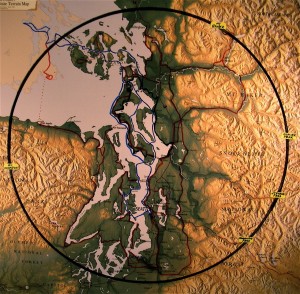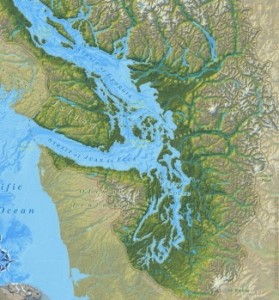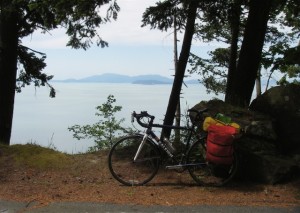Edmonds United Methodist Church, Sunday, April 7, 2013 This is the text of my Earth Sunday sermon last Sunday entitled "Turning for Home: Healing the Earth by Loving the Places We Live". I don't often give sermons, but it is an interesting and useful challenge for me to work on different ways of communicating about why it matters to care. And the faith community is obviously an essential partner in crafting the changes we are now called to make.
****************************************************************************
Earth Sunday is a special time set aside to explore our deep kinship with the earth that sustains us, and what it means as Christians to honor that kinship, what it means to return that love as stewards and sustainers of the earth community. It's an honor to be with you on Earth Sunday.
I want to start by acknowleging some of the important steps that your church has taken already, under the leadership of your Green Team, to build an earth-friendly congregation, doing the important nuts & bolts things that make that happen - like changing all light bulbs throughout the facility, eliminating styrofoam cups, and composting food wastes. And doing some of the bigger things too like investing in a new and more efficient furnace. We should never doubt the importance of even small, concrete steps to align our faith with our actions. It is all the more significant when our efforts to make change can grow out of community, and generate a more vibrant community in the process, as your efforts here clearly have. Earth Sunday is a time when we can celebrate these efforts, make them visible, and renew our commitment to grow more deeply into an earth-honoring spirit of faith and practice.
Many of us who care about ecological concerns are feeling a growing urgency these days. The stakes have become huge. It occurs to me that your Earth Sunday this year falls right between Easter and Earth Day, and there is actually a compelling link between the two celebrations. When you think about it, both are rooted in the renewal of life in the face of death.
Earth Day may have more in common with Easter than I had previously imagined. The earth too is suffering a kind of human betrayal and abondonment, just as Christ did on his way to the cross, and this abuse is coming back to engulf us. I think many of us feel this new urgency, this gnawing sense that we have to change much more than just light bulbs. We have to find the courage to change ourselves, to transform the way we live in response to the magnitude of crises facing us. We live in a time of staggering losses to our living earth, losses that are rooted in our human forgetfulness, manifesting as pollution of the air we breath, the water we drink, the soil that grows our food, as loss of habitat and species extinction. And now it confronts us in the form of climate disruption that has been clearly tied to our unbridled patterns of consumption.
The earth itself is developing a dangerous fever. Remarkably, it turns out that we humans are both the cause of that fever, and the doctor on call, the only ones with the power to bring healing. What an astonishing situation!
Quite literally, the fate of our human lives is no longer separate from the fate our endangered earth. This is certainly not a new insight. Our interdependence with nature is part of our biblical understanding. But it could be said that the scale to which this is now true is a new thing under the sun. Who could have imagined that our species might prove capable of changing the very climate upon which all life depends? This presents a powerful challenge to our understanding not only of what it means to be Christians, but of what it means to be human. For people of faith, Earth Day needs to be recast as the moral crucible that it is.
What this suggests for me is an expansion of our moral concern to include the sanctity of nature, and not just the domain of human activity. These two dimensions of moral concern have become inseparable in our time.
I think God has given us these great ecological challenges to see what we are really made of. And I don't think God would have given us these challenges if we didn't already have within us the capacity to meet and heal them, to learn and grow from them, to become better human beings because of them. I think there is no greater measure of faith in our time, or of the call to moral integrity, than our willingness to become dedicated healers and restorers of the Creation God has woven us into, and not merely passive consumers of it. No one who is paying even modest attention to ecological trends can dispute the moral imperative these trends bring to us.
It's an exciting moment to be alive. It could be seen as a great testimony of the confidence God has placed in us that we have been given our life at just this time, with exactly this set of challenges before us. When someone asked the great eco-theologian Father Thomas Berry what they could do to meet this crisis, and not to become mired in despair, he said, “Make a creative response.”
That sounds deceptively simple. "Make a creative response." But is that not what God is now calling us to do. The time of waiting for others to step forward, for others to invent the miracle technologies that will save us from our own excesses, for others to enact the laws that will save us from our own excesses – that time is over. It is time for us to make our own creative responses, individually and together, that will show what a more vibrant and sustainable life on this earth actually look like.
I was invited to join you for Earth Sunday because some of you have read my book The Circumference of Home, and felt that my story is relevant to this task we share of re-inventing our lives along more sustainable pathways. I won't recount much here about that story here. What I want to say this morning is this. My choice to live car-free for a year in 2008, and to stay within walking distance of home, grew out of a growing awareness that I was not walking my talk. An enormous gap had opened up between my profound ecological concerns, and the way I was actually living my life. I felt trapped inside that gap, and it had become too painful for me to take sitting down. Something had to give.
The insight that led me to this yearlong vow – my “Ah ha!” moment – was that I could turn toward this crisis as an adventure of the spirit, rather than languishing on the sidelines in fear and despair, which I was becoming very good at. As I wrote in my introduction, “If I can't change my own life in response to the greatest challenge now facing our human family, who can? And if I won't make the effort to try, why should anyone else? The question is no longer whether I must respond. The question is whether I can turn my response into an adventure.”
I was actually quite nervous when I began this experiment. It carried some real risks. By swearing off cars for a than I already was, more isolated from my community. Would it unsettle my marriage and make me even harder to live with? These are fears we all face when we meet with big changes. Change is hard. It can be scary.
But for me, once I had begun my experiment, the opposite happened. I have rarely felt more alive, more engaged, more held by community, less burdened by self-doubt, than I was during that year. My wife still tells people that she has never seen me happier. And as she shared in parts of my adventure, it brought us closer together.
 By drawing a circle on the map with my home at the center, and by spending a year exploring this home circle on foot, by bicycle and sea kayak, I not only loosened the shackles of fear and despair that had held me in their grip, I not only gained in health and vitality, but I fell back in love with the place I call Home. I fell in love again with the ecological and cultural richness of this bio-region. I discovered deep reservoirs of local community that I had forgotten in my too-busy, far-flung lifestyle. I shared grand adventures with my wife and children close to home, deepening our affection for each other, even as we grew more intimate with this place on earth that we all so love. I learned how to get almost anywhere in my home region by public transportation and bicycle, transforming my addiction to cars into a more embodied and creative way of moving through my home terrain. And in the process, I lowered my carbon footprint dramatically, easing that painful gap between my beliefs and the way I was actually living.
By drawing a circle on the map with my home at the center, and by spending a year exploring this home circle on foot, by bicycle and sea kayak, I not only loosened the shackles of fear and despair that had held me in their grip, I not only gained in health and vitality, but I fell back in love with the place I call Home. I fell in love again with the ecological and cultural richness of this bio-region. I discovered deep reservoirs of local community that I had forgotten in my too-busy, far-flung lifestyle. I shared grand adventures with my wife and children close to home, deepening our affection for each other, even as we grew more intimate with this place on earth that we all so love. I learned how to get almost anywhere in my home region by public transportation and bicycle, transforming my addiction to cars into a more embodied and creative way of moving through my home terrain. And in the process, I lowered my carbon footprint dramatically, easing that painful gap between my beliefs and the way I was actually living.
Of course I still have a long way to go in healing these personal gaps. That year was just a beginning. I never meant these actions as a blueprint for others to follow. Nor was it intended as a permanent solution for me.
I do drive again. But I am a lot more careful about when I get in my car, and why. I'm committed to using the best available technology when I do drive. I drove my all-electric car here this morning, a car that gets the equivalent of 112 mile per gallon. But that's no reason for complacency either. My bicycle gets 1,000 miles per gallon. The bicycle is still the most efficient machine ever invented for moving a human body through the landscape. Just give the driver a sandwich, and you have all the fuel you need.
So I still use my bike whenever I can. And when I ride these days, it's not to make a moral statement. I simply feel better when I do. I feel more alive when I ride my bike or walk. I feel more hopeful. I feel more connected to my community. It is a long term shift in my lifestyle that has made my life richer and better.
The important question this morning isn't what I've done, or what I'm doing next. The important question is what are you going to do. What are we willing to do together to make a creative response, to turn these challenges into a shared adventure. Our unborn grandchildren are watching to see what we come up with. Their life is literally hanging in the balance of the choices we make now.
So may the adventure continue. May we share in it together. May we gain in confidence and resilience. And may this Earth Sunday mark a fresh beginning in our commitment to bring that adventure Home, to live joyously and simply in the miracle of our lives, right here in this exquisite place on earth.




